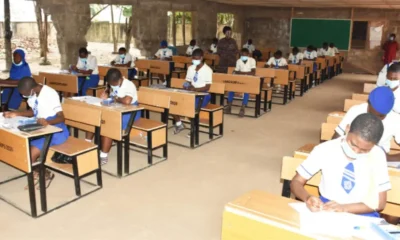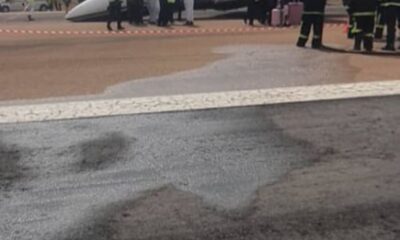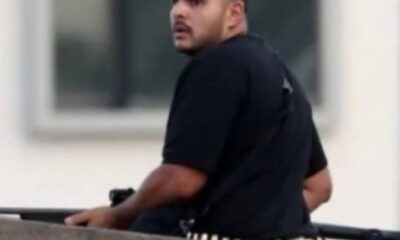Politics
Islamic State: Germany and Europe are once again a target
The attack in Solingen is just the latest example of a new wave of violence linked to the Islamic State terrorist group. Experts say the war in the Middle East is the main catalyst.

The deadly stabbings in Solingen have been claimed by the Islamic State (IS)
© Sascha Schuermann/Getty Images
The terrorist militia Islamic State (IS) has claimed responsibility for the knife attack in Solingen. According to Amak, the mouthpiece of IS, the attack was carried out in “revenge for Muslims in Palestine and elsewhere” and targeted a “group of Christians.”
“Extremists are using the ongoing conflict in the Middle East as a way to gain momentum,” Thomas Mücke told DW. He works for the Violence Prevention Network (VPN), an organization dedicated to preventing extremism and deradicalizing violent criminals. Since October 7, 2023, when Hamas killed scores of Israeli civilians and Israel responded with a counterattack in the Gaza Strip, Mücke has seen “a fourfold increase” in the number of attacks and attempted attacks in Western Europe in comparison to 2022.
The attack in Solingen was one of a whole series of Islamist attacks and attempted attacks across Europe in recent weeks, although it is not always clear whether it was IS that was behind them.
On the same day as the attack in Solingen, two cars exploded outside a synagogue in La Grande-Motte in southern France.
Austrian authorities arrested two suspected IS sympathizers shortly before two planned concerts by US singer Taylor Swift in Vienna in early August. The main suspect, a 19-year-old Austrian with North Macedonian roots, said at the time of his arrest that he wanted to “kill himself and a large group of people,” according to Austrian state security. The concerts were canceled.
In late May, an Afghan living in Germany fatally injured a police officer and seriously injured five other people in Mannheim. The attack was aimed at the chairman of Pax Europa, a movement critical of Islam. While no direct links to ISIS were found in this case, investigators classified the attack as “religiously motivated.”
In the wake of this attack, authorities in both Germany and France expressed serious concerns about IS violence during this summer’s European Football Championships in Germany and the Olympic Games in Paris. Both of these major events went off peacefully, but perhaps only thanks to increased security measures and more border controls.
Authorities have documented seven attacks and 21 attempted or planned attacks in Western Europe since October 7, 2023. Mücke thinks the rise is not surprising: “IS identified Western Europe as a target for attacks, obviously with the intention of spreading horror and fear and dividing society so that they can recruit even more people for their cause.”
The most serious attack claimed by IS in recent times was not in Western Europe, but in Moscow in March 2024, when more than 140 people were killed in a terrorist attack on a concert hall. “Islamic State soldiers attacked a large gathering of Christians, killing and injuring hundreds,” Amak reported.
Radicalization via the internet
The terrorist organization came to global prominence 10 years ago when its then-leader, Abu Bakr al-Baghdadi, announced the establishment of a “caliphate” in the Near and Middle East. IS reached the peak of its power the following year, taking control of large parts of Syria and Iraq. Videos of brutal killings and beheadings, in particular, were posted online.
“IS is constantly calling for such attacks with its internet propaganda,” Mücke said, “and there are also precise instructions on how to carry out attacks, such as using cars to kill infidels everywhere.”
In one particularly horrific case, an IS sympathizer drove a truck into at a Berlin Christmas market in 2016, killing twelve people.
By 2019, many believed IS had been militarily defeated in the Middle East. IS attacks in Europe also declined for a while. However, with this new wave of attacks, jihadism seems to have returned.
Mücke says that the perpetrators have become younger, with two-thirds of those arrested in Western Europe being teenagers. And the methods that are being used to appeal to them are also tailored to their age. “The internet plays a major role in radicalization and mobilization, as well as in recruitment.”
A glimmer of hope: early detection of radicalization
Experts are pessimistic about the prospects for improvement in the near future. The escalation of the conflict in the Middle East as of October 7, 2023 “will continue to influence the dynamics of terrorism for years to come.”
In the eyes of many experts, creating knife-free zones, as Germany’s Interior Minister Nancy Faeser plans to do, is of little use. According to them, someone who intends to kill people with a knife is unlikely to be deterred by such a ban.
Nevertheless, Thomas Mücke from the Violence Prevention Network does have a glimmer of hope to share. “Since October 7, the number of calls to the counseling hotlines has multiplied. And that gives us the information we need to try to intercept radicalization at a relatively early stage.”
The fact that the perpetrators are now younger is also an opportunity, he says. “To start with, I’m counting on the fact that people who become radicalized will undergo a significant change in their character and that this will be noticed by those around them,” he says.
“And it’s important that these changes are reported as quickly as possible, that help and support is sought because every extremist scene tries to appeal to and recruit the younger generation in particular; they’re the next generation. And this is where we still have the best chance of curbing extremism and terrorism.”
This article was originally written in German.
While you’re here: Every Tuesday, DW editors round up what is happening in German politics and society. You can sign up here for the weekly email newsletter Berlin Briefing.
Author: Christoph Hasselbach
Politics
Breaking: Diri Orders Autopsy on Bayelsa Deputy Governor’s Death, Warns Against Politicisation
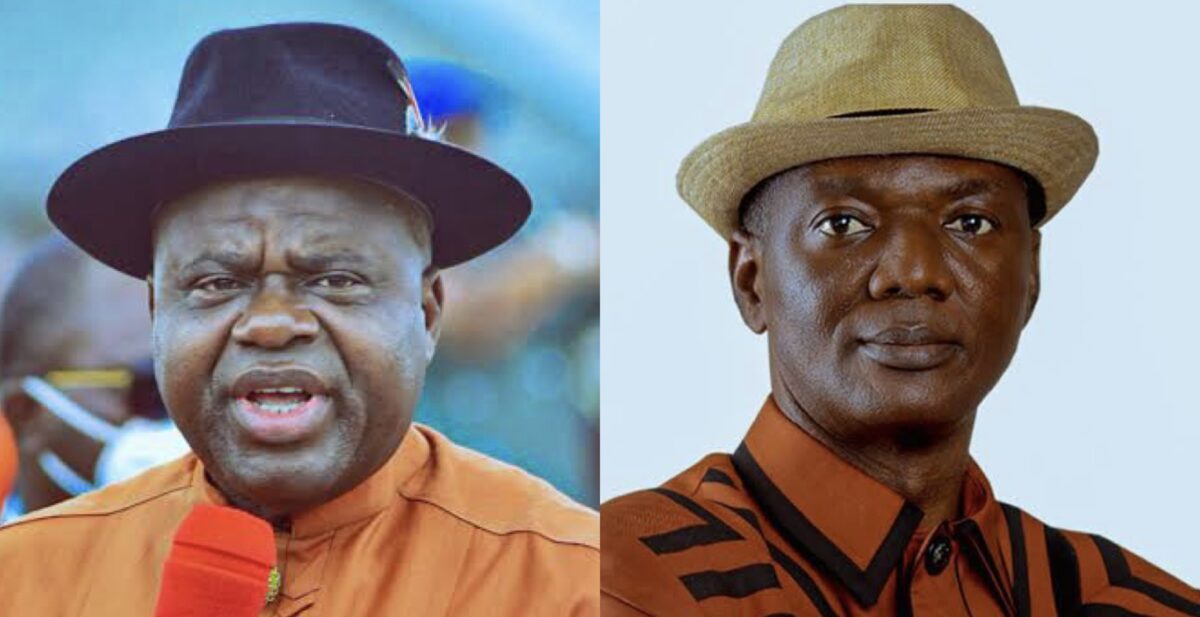
Bayelsa State Governor, Senator Douye Diri, has ordered an autopsy to determine the cause of death of the state’s Deputy Governor, Lawrence Ewhrudjakpo.
Governor Diri gave the directive on Saturday while receiving former President Goodluck Jonathan at the Government House in Yenagoa.
Reacting to the incident, the governor condemned what he described as widespread misinformation and speculation on social media, warning against any attempt to politicise the deputy governor’s death.
“I want to make an appeal. I have seen people politicise his death. In Ijaw land, there is no enmity in death. Let nobody politicise the passing of our dearly beloved deputy governor,” Diri said.
“If anyone truly loves him, this is the time to show it. I have directed that an autopsy be carried out to reveal the cause of his death. There is a lot of nonsense going on on social media.”
The governor further urged the public to focus on mourning and honouring the late deputy governor, noting that the state government had declared three working days of mourning in his honour.
“If anyone is issuing statements to eulogise him, let it end there. Let us mourn him because Bayelsa State is in a mourning mood,” he added.
Governor Diri also called for unity and love among the people, reminding them of the inevitability of death.
Speaking during the condolence visit, former President Goodluck Jonathan described the late Ewhrudjakpo as a committed and dedicated individual who played a key role in the activities of his foundation.
“For me, he was someone my foundation and I will never forget. He represented the governor in all our programs,” Jonathan said, adding that Ewhrudjakpo worked tirelessly in that role, even more than when he served as deputy governor.
Politics
N1.4 Trillion not enough to get me into politics – Bishop Oyedepo reveals
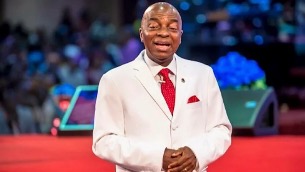
The founder of Living Faith Church, Bishop David Oyedepo, has said he will never take part in partisan politics, not for even billions of naira.
He stated that no amount of money, including “$1 billion,” (1.4 Trillion naira) would make him join politics.
Oyedepo made this known during an impartation service at Shiloh 2025 held at the church’s headquarters in Canaanland, Ota, Ogun State.
He explained that partisan politics is not part of his life’s calling and that is why he has chosen to stay away from it.
In his words: “In 2015, I warned the church that trouble was coming. Didn’t trouble come?
“Partisan politics is off my calling. If you give me $1 billion to join politics, I won’t, because it is off my course.”
The bishop also said the world is in urgent need of God’s intervention because of the times we are living in.
According to him, believers are being trained as an end-time army to bring solutions to national and global problems, similar to what biblical figures like Joseph and Daniel did.
EVENTS
Wike at 58: “You’re a Shinning Star in my Cabinet, Tinubu hails Wike.
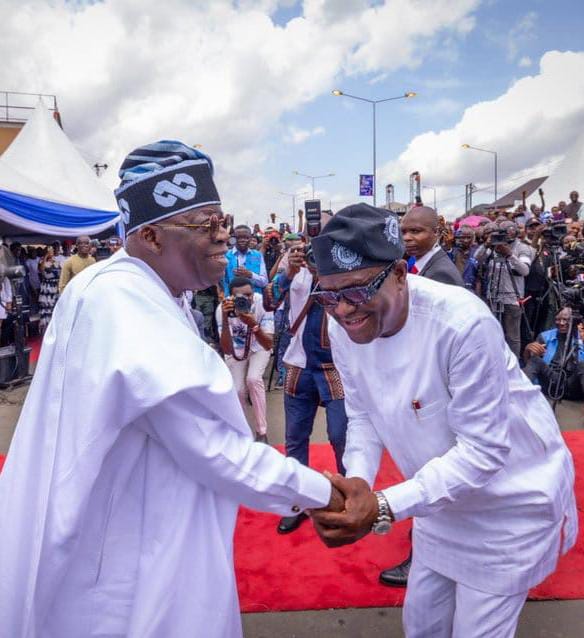
President Bola Tinubu congratulates Chief Nyesom Wike, Minister of the Federal Capital Territory (FCT), on his birthday, December 13.
President Tinubu celebrates with the Minister and former governor of Rivers State, giving thanks to God Almighty for enriching him with a life defined by purpose, service, and courage.
The President describes Chief Wike as an audacious top performer who defies obstacles and delivers results.
President Tinubu acknowledges the ongoing transformation of the Federal Capital Territory through infrastructure expansion, highlighting the Minister’s recent intervention that broke the 14-year logjam in the construction of the Apo-Karshi road.
The President commends Chief Wike for his resilience, can-do attitude, and commitment to excellence in all assignments.
President Tinubu thanks the Minister for his consistent efforts in delivering results and wishes him a happy birthday and strength to further his good work in the FCT.
“Nyesom Wike has been one of the shining stars in the cabinet, an exceptional performer, developing infrastructure in the Federal capital as never seen before and proving that his moniker as ‘Mr Project’ is not limited to his home state of Rivers.
“I commend him for being one of the champions of our Renewed Hope Agenda, even though he belongs to another party and wish him well as he marks another year in his life journey”.
Bayo Onanuga
Special Adviser to the President
(Information and Strategy)
December 13, 2025
-
Business1 year ago
US court acquits Air Peace boss, slams Mayfield $4000 fine
-

 Trending1 year ago
Trending1 year agoNYA demands release of ‘abducted’ Imo chairman, preaches good governance
-

 Politics1 year ago
Politics1 year agoMexico’s new president causes concern just weeks before the US elections
-

 Politics1 year ago
Politics1 year agoPutin invites 20 world leaders
-

 Politics1 year ago
Politics1 year agoRussia bans imports of agro-products from Kazakhstan after refusal to join BRICS
-
Entertainment1 year ago
Bobrisky falls ill in police custody, rushed to hospital
-
Entertainment1 year ago
Bobrisky transferred from Immigration to FCID, spends night behind bars
-
Education1 year ago
GOVERNOR FUBARA APPOINTS COUNCIL MEMBERS FOR KEN SARO-WIWA POLYTECHNIC BORI

